|
Books Should Be Free Loyal Books Free Public Domain Audiobooks & eBook Downloads |
|
|
Books Should Be Free Loyal Books Free Public Domain Audiobooks & eBook Downloads |
|
Philosophy Books |
|---|
|
Book type:
Sort by:
View by:
|
By: Mary Wollstonecraft (1759-1797) | |
|---|---|
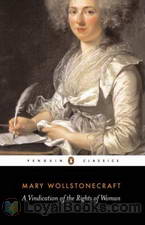 A Vindication of the Rights of Woman
A Vindication of the Rights of Woman
Regarded as the one of the earliest examples of feminist philosophy, A Vindication of the Rights of Woman is written as a direct response to Charles Maurice de Talleyrand-Périgord, a French politician who delivered a report to the French National Assembly suggesting that women should only receive domestic education and additionally encourages women to stay clear of political affairs. In her treatise, Wollstonecraft avidly criticizes this inadequate perception of women as an inferior sex and attacks social inequality, while also arguing for women’s rights in the hope of redefining their position both in society and in marriage... | |
By: Gelett Burgess (1866-1951) | |
|---|---|
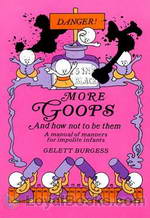 More Goops and How Not to Be Them
More Goops and How Not to Be Them
Deep in the heart of every parent is the wish, the desire, to have other adults tell us, in an unsolicited way, just how very polite one’s child is! This perhaps was even more the case in 1903, when Gelett Burgess produced his second book on the Goops. With entertaining cartoons – cariacatures of misbehaving children – he described many different breaches of tact and good manners. Burgess wrote several books of poetry on the Goops, each poem describing some significant way in which an unthoughtful or unkind child could offend polite society and often offering the hope that the listener would never behave that way... | |
By: Alfred Binet (1857-1911) | |
|---|---|
 The Mind and the Brain
The Mind and the Brain
Today, almost every layperson understands the concept of intelligence tests and can glibly discuss IQ scores. In fact, these have become so common in the popular imagination that magazines, websites and pop quizzes offer to assess your intelligence at the drop of a hat! In this scenario, it's interesting to recall the very first person who proposed the concept of measurable intelligence. Alfred Binet was basically a clinical psychologist whose wide-ranging interests in learning difficulties faced by school children prompted him to undertake extensive studies in human cognition, psychology, learning and behavior... | |
By: Mary Everest Boole (1832-1916) | |
|---|---|
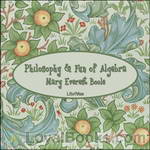 Philosophy and Fun of Algebra
Philosophy and Fun of Algebra
Mary Everest Boole (1832-1916) was born Mary Everest in England and spent her early years in France. She married mathematician George Boole. She was the author of several works on teaching and teaching mathematics in particular. This short book, Philosophy and Fun of Algebra, is meant to be read by children and introduces algebra and logic. She uses the word “algebra” broadly, defining it as a “method of solving problems by honest confession of one’s ignorance”. Using this definition, Boole introduces, in a conversational manner, the concepts of logic and algebra, illustrating these concepts with stories and anecdotes, often from biblical sources... | |
By: H. G. Wells (1866-1946) | |
|---|---|
 First and Last Things
First and Last Things
| |
By: William James (1842-1910) | |
|---|---|
 Essays in Radical Empiricism
Essays in Radical Empiricism
William James (1842 – 1910) was a pioneering American psychologist and philosopher. He wrote influential books on the young science of psychology, educational psychology, psychology of religious experience and mysticism, and the philosophies of pragmatism and Radical Empiricism. Essays in Radical Empiricism is a collection edited and published posthumously by his colleague and biographer Ralph Barton Perry in 1912. It was assembled from a collection of reprinted journal articles published from 1904–1905 which James had deposited in August 1906 at Harvard University, for supplemental use by his students. | |
 Varieties of Religious Experience
Varieties of Religious Experience
The Varieties of Religious Experience: A Study in Human Nature is a book by the Harvard psychologist and philosopher William James that comprises his edited Gifford Lectures on "Natural Theology" delivered at the University of Edinburgh in Scotland between 1901 and 1902. These lectures concerned the nature of religion and the neglect of science, in James' view, in the academic study of religion. Soon after its publication, the book found its way into the canon of psychology and philosophy, and has remained in print for over a century. | |
 The Moral Equivalent of War
The Moral Equivalent of War
The Moral Equivalent of War, the last public utterance of William James, is significant as expressing the opinions of a practical psychologist on a question of growing popular interest. For the past fifteen years the movement for promoting international peace has been enlisting the support of organizations and individuals the world over. That this is a question on which much may be said for the opposition, James, though a pacificist, admits with his usual fair-mindedness, pointing out that militarism... | |
 Pragmatism
Pragmatism
'Pragmatism' contains a series of public lectures held by William James in Boston 1906–7. James provides a popularizing outline of his view of philosophical pragmatism while making highly rhetorical and entertaining lashes towards rationalism and other competing schools of thought. James is especially concerned with the pragmatic view of truth. True beliefs should be defined as, according to James, beliefs that can successfully assist people in their everday life. This is claimed to not be relativism... | |
 The Will to Believe : and Other Essays in Popular Philosophy
The Will to Believe : and Other Essays in Popular Philosophy
| |
 Meaning of Truth
Meaning of Truth
| |
 Memories and Studies
Memories and Studies
| |
By: Vladimir Ilyich Lenin (1870-1924) | |
|---|---|
 Two Tactics of Social-Democracy in the Democratic Revolution
Two Tactics of Social-Democracy in the Democratic Revolution
In the heat of the failed 1905 revolution in Russia, Lenin here contrasts the precision of the Bolshevik political program and tactics with various inconsistent and servile factions within the Russian Social-Democratic Labor Party. | |
By: M. M. Mangasarian (1859-1943) | |
|---|---|
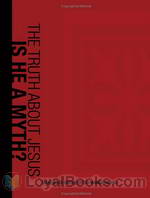 The Truth About Jesus. Is He a Myth?
The Truth About Jesus. Is He a Myth?
The following work offers in book form the series of studies on the question of the historicity of Jesus, presented from time to time before the Independent Religious Society in Orchestra Hall, Chicago, 1909. No effort has been made to change the manner of the spoken, into the more regular form of the written, word. | |
By: Evelyn Underhill | |
|---|---|
 The Life of the Spirit and the Life of Today
The Life of the Spirit and the Life of Today
Underhill emphasizes the practical, here-and-now nature of spiritual life. She argues that spirituality is a genuine and abiding human fact, and that any complete description of human life must find room for the spiritual factor, and for the religious life in which it finds expression. | |
By: Friedrich Schiller (1759-1805) | |
|---|---|
 Philosophical Letters of Frederich Schiller
Philosophical Letters of Frederich Schiller
| |
By: Okakura Kakuzo (1863-1913) | |
|---|---|
 The Book of Tea
The Book of Tea
The Book of Tea was written by Okakura Kakuzo in the early 20th century. It was first published in 1906, and has since been republished many times. – In the book, Kakuzo introduces the term Teaism and how Tea has affected nearly every aspect of Japanese culture, thought, and life. The book is noted to be accessibile to Western audiences because though Kakuzo was born and raised Japanese, he was trained from a young age to speak English; and would speak it all his life, becoming proficient at communicating his thoughts in the Western Mind... | |
By: William George Jordan (1864-1928) | |
|---|---|
 The Majesty of Calmness
The Majesty of Calmness
Change your life by changing your thoughts. The Majesty of Calmness is your guide to attracting prosperity, manifesting opportunities, and managing stress–all while discovering the values most precious to you. | |
By: John Ruskin (1819-1900) | |
|---|---|
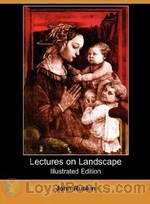 Lectures on Landscape
Lectures on Landscape
A series of lectures on landscape painting delivered at Oxford in 1871, by artist, critic, and social commentator, John Ruskin. | |
 Unto this Last: Four Essays on the First Principles of Political Economy
Unto this Last: Four Essays on the First Principles of Political Economy
John Ruskin (1819 – 1900) is best known for his work as an art critic and social critic, but is remembered as an author, poet and artist as well. Unto This Last is an important work of political economic though that influenced Gandhi, among others. (Hugh McGuire/Wikipedia) | |
 The Ethics of the Dust
The Ethics of the Dust
| |
By: John Locke (1632-1704) | |
|---|---|
 Two Treatises of Civil Government
Two Treatises of Civil Government
The Two Treatises of Civil Government is a work of political philosophy published anonymously in 1689 by John Locke. The First Treatise is an extended attack on Sir Robert Filmer’s Patriarcha, which argued for a divinely-ordained, hereditary, absolute monarchy. The more influential Second Treatise outlines a theory of civil society based on natural rights and contract theory. Locke begins by describing the “state of nature,” and goes on to explain the hypothetical rise of property and civilization, asserting that the only legitimate governments are those which have the consent of the people... | |
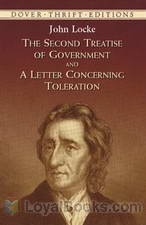 A Letter Concerning Toleration
A Letter Concerning Toleration
Letter Concerning Toleration by John Locke was originally published in 1689. Its initial publication was in Latin, though it was immediately translated into other languages. In this “letter” addressed to an anonymous “Honored Sir” (actually Locke’s close friend Philip von Limborch, who published it without Locke’s knowledge) Locke argues for a new understanding of the relationship between religion and government. One of the founders of Empiricism, Locke develops a philosophy that is contrary to the one expressed by Thomas Hobbes in Leviathan, primarily because it supports toleration for various Christian denominations... | |
By: John Locke (1632-1704) | |
|---|---|
 Essay Concerning Humane Understanding
Essay Concerning Humane Understanding
John Locke's essays on human understanding answers the question “What gives rise to ideas in our minds?”. In the first book Locke refutes the notion of innate ideas and argues against a number of propositions that rationalists offer as universally accepted truth. In the second book Locke elaborates the role played by sensation, reflection, perception and retention in giving rise to simple ideas. Then he elaborates on how different modes, substances and relations of simple ideas (of the same kind) give rise to complex ideas v... | |
By: Epictetus (c.55-135) | |
|---|---|
 The Enchiridion
The Enchiridion
Epictetus (Greek: Επίκτητος; c.55–c.135) was a Greek Stoic philosopher. The name given by his parents, if one was given, is not known – the word epiktetos in Greek simply means “acquired.” Epictetus spent his youth as a slave in Rome to Epaphroditos, a very wealthy freedman of Nero. Even as a slave, Epictetus used his time productively, studying Stoic Philosophy under Musonius Rufus. He was eventually freed and lived a relatively hard life in ill health in Rome. So far as is known, Epictetus himself wrote nothing... | |
 The Golden Sayings of Epictetus
The Golden Sayings of Epictetus
Aphorisms from the Stoic Greek. | |
By: Georg Wilhelm Friedrich Hegel (1770-1831) | |
|---|---|
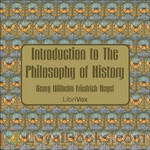 Introduction to The Philosophy of History
Introduction to The Philosophy of History
The introduction to Hegel’s lectures on the philosophy of world history is often used to introduce students to Hegel’s philosophy, in part because Hegel’s sometimes difficult style is muted in the lectures, and he discourses on accessible themes such as world events in order to explain his philosophy. Much of the work is spent defining and characterizing Geist or spirit. Geist is similar to the culture of people, and is constantly reworking itself to keep up with the changes of society, while at the same time working to produce those changes through what Hegel called the “cunning of reason”... | |
By: George Santayana (1863-1952) | |
|---|---|
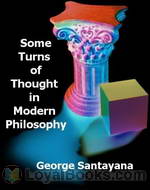 Some Turns of Thought in Modern Philosophy
Some Turns of Thought in Modern Philosophy
Before the beginning of World War II, during the time of the Modernist movement in philosophy, George Santayana wrote these five descriptive essays. He examined John Locke’s sensationalism, British Idealism, the “Theory of Relativity”, Freud’s psychology, and Julien Benda’s preachment on the relations between God and the world. [Summary written by Gary Gilberd] | |
 The Life of Reason volume 1
The Life of Reason volume 1
The Life of Reason, subtitled "the Phases of Human Progress", is a book published in five volumes from 1905 to 1906, by Spanish-born American philosopher George Santayana (1863-1952). It consists of Reason in Common Sense, Reason in Society, Reason in Religion, Reason in Art, and Reason in Science. The work is considered to be the most complete expression of Santayana's moral philosophy [...]. Santayana's philosophy is strongly influenced by the materialism of Democritus and the refined ethics of Aristotle, with a special emphasis on the natural development of ideal ends... | |
 The Sense of Beauty Being the Outlines of Aesthetic Theory
The Sense of Beauty Being the Outlines of Aesthetic Theory
| |
 Winds of Doctrine: Studies in Contemporary Opinion
Winds of Doctrine: Studies in Contemporary Opinion
Even before the Great War turned the world upside down, Western civilization was being revolutionized at all levels: intellectually, philosophically, artistically. Noted positivist philosopher George Santayana published this volume on the eve of the War, trying to portray the status of philosophy and theology at that moment by analyzing six significant topics: 1. the intellectual "temper" of the age 2. the clash between Modernism and Christianity 3. the new idealism of Henri Bergson 4. the new skepticism of Bertrand Russell 5. Shelley's fusion of philosophy and poetry 6. the so-called "genteel" tradition in American philosophy. | |
By: Henry L. Mencken (1880-1956) | |
|---|---|
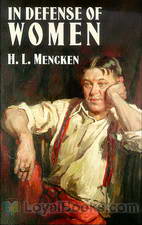 In Defense of Women
In Defense of Women
In Defense of Women is H. L. Mencken’s 1918 book on women and the relationship between the sexes. Some laud the book as progressive while others brand it as reactionary. While Mencken didn’t champion women’s rights, he described women as wiser in many novel and observable ways, while demeaning average men. According to Mencken’s biographer, Fred Hobson: Depending on the position of the reader, he was either a great defender of women’s rights or, as a critic labelled him in 1916, ‘the greatest misogynist since Schopenhauer’,'the country’s high-priest of woman-haters.’ | |
By: Peter Kropotkin (1842-1921) | |
|---|---|
 The Conquest of bread
The Conquest of bread
In this work, Kropotkin points out what he considers to be the fallacies of the economic systems of feudalism and capitalism, and how he believes they create poverty and scarcity while promoting privilege. He goes on to propose a more decentralised economic system based on mutual aid and voluntary cooperation, asserting that the tendencies for this kind of organisation already exist, both in evolution and in human society. | |
By: Friedrich Nietzsche (1844-1900) | |
|---|---|
 Case of Wagner / Nietzsche Contra Wagner / Selected Aphorisms
Case of Wagner / Nietzsche Contra Wagner / Selected Aphorisms
A collection of three of Nietzsche's writings concerning the music of Wagner. In particular, he relates Wagner's music as degenerate, unrefined and unintelligent and relates it to a gradually degenerating German culture and society. The translator provides a detailed introduction. | |
By: Friedrich Wilhelm Nietzsche (1844-1900) | |
|---|---|
 Homer and Classical Philology
Homer and Classical Philology
| |
 We Philologists Complete Works of Friedrich Nietzsche, Volume 8
We Philologists Complete Works of Friedrich Nietzsche, Volume 8
| |
 Thoughts out of Season Part I
Thoughts out of Season Part I
| |
By: Samuel Butler (1835-1902) | |
|---|---|
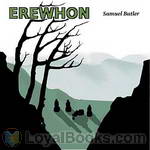 Erewhon
Erewhon
Erewhon, or Over the Range is a novel by Samuel Butler, published anonymously in 1872. The title is also the name of a country, supposedly discovered by the protagonist. In the novel, it is not revealed in which part of the world Erewhon is, but it is clear that it is a fictional country. Butler meant the title to be read as the word Nowhere backwards, even though the letters “h” and “w” are transposed. It is likely that he did this to protect himself from accusations of being unpatriotic, although Erewhon is obviously a satire of Victorian society. | |
 Erewhon Revisited
Erewhon Revisited
| |
 Selections from Previous Works and Remarks on Romanes' Mental Evolution in Animals
Selections from Previous Works and Remarks on Romanes' Mental Evolution in Animals
| |
By: Varous | |
|---|---|
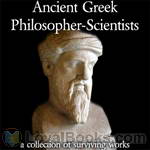 Ancient Greek Philosopher-Scientists
Ancient Greek Philosopher-Scientists
The Pre-Socratic Greek philosophers, that is, the philosopher-scientists who lived before or contemporaneously to Socrates, were the first men in the Western world to establish a line of inquiry regarding the natural phenomena that rejected the traditional religious explanations and searched for rational explanations. Even though they do not form a school of thought, they can be considered the fathers of philosophy and many other sciences as we have them now. None of their works is extant, so, in this collection, we present the textual fragments, when existing, of ten Pre-Socratic philosopher-scientists, and quotations and testimonials about them left by later authors... | |
By: Lucius Annaeus Seneca | |
|---|---|
 Of the Shortness of Life
Of the Shortness of Life
De Brevitate Vitae ("Of the Shortness of Life") is a moral essay written by Seneca the Younger, a Roman Stoic philosopher, to his friend Paulinus. The philosopher brings up many Stoic principles on the nature of time, namely that men waste much of it in meaningless pursuits. According to the essay, nature gives man enough time to do what is really important and the individual must allot it properly. In general, time can be best used in the study of philosophy, according to Seneca. | |
By: Martin Luther (1483-1546) | |
|---|---|
 Martin Luther's 95 Theses
Martin Luther's 95 Theses
| |
By: Nagarjuna | |
|---|---|
 She-rab Dong-bu (The Tree of Wisdom)
She-rab Dong-bu (The Tree of Wisdom)
The She-rab Dong-bu (Tree of Wisdom) is a metrical translation in Tibetan of a Sanscrit ethical work entitled Prajnya Danda, written by Nagarjuna who flourished in the fourth century of the Buddhist era (about 100 B.C.), The Tibetan version was probably made about the 11th century of our era but the exact date has not been determined. It is included in the Ten-gyur, ངོ་ section, volume གོ་, beginning at leaf 165. The Tibetan translator describes it as the second volume but I cannot say whether the remainder of the work has been preserved in Tibetan – the Sanscrit original is apparently lost. | |
By: Thomas Henry Huxley (1825-1895) | |
|---|---|
 Has a Frog a Soul?
Has a Frog a Soul?
Thomas Huxley, known as “Darwin’s Bulldog” for his championing and development of Darwinism, was perhaps the most important Victorian biologist after Darwin himself. This speech to the Metaphysical Society in 1870 is one of Huxley’s best known texts outside the sphere of his specialism, and remains read today by students of philosophy. In it, Huxley argues from the results of vivisection to metaphysics. | |
By: Rupert Brooke | |
|---|---|
 Collected Poems of Rupert Brooke
Collected Poems of Rupert Brooke
Rupert Chawner Brooke (August 3, 1887 – April 23, 1915) was an English poet known for his idealistic War Sonnets written during the First World War (especially The Soldier), as well as for his poetry written outside of war, especially The Old Vicarage, Grantchester and The Great Lover. He was also known for his boyish good looks, which prompted the Irish poet William Butler Yeats to describe him as “the handsomest young man in England”. | |
By: Niccolò Machiavelli (1469-1527) | |
|---|---|
 Machiavelli, Volume I
Machiavelli, Volume I
| |
By: Herbert Spencer (1820-1903) | |
|---|---|
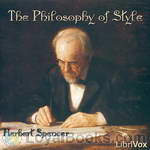 The Philosophy of Style
The Philosophy of Style
“The Philosophy of Style,” explored a growing trend of formalist approaches to writing. Highly focused on the proper placement and ordering of the parts of an English sentence, [Spencer] created a guide for effective composition. Spencer’s aim was to free prose writing from as much “friction and inertia” as possible, so that the reader would not be slowed by strenuous deliberations concerning the proper context and meaning of a sentence. | |
 Essays: Scientific, Political, & Speculative, Vol. I
Essays: Scientific, Political, & Speculative, Vol. I
| |
By: Charlotte Perkins Gilman (1860-1935) | |
|---|---|
 Herland
Herland
Herland is a utopian novel from 1915, written by feminist Charlotte Perkins Gilman. The book describes an isolated society comprised entirely of Aryan women who reproduce via parthenogenesis (asexual reproduction). The result is an ideal social order, free of war, conflict and domination. It first appeared as a serial in Perkin’s monthly magazine Forerunner. | |
By: Winston Churchill (1871-1947) | |
|---|---|
 The Inside of the Cup
The Inside of the Cup
| |
By: Henri Bergson (1859-1941) | |
|---|---|
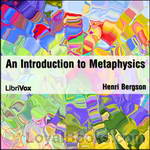 An Introduction to Metaphysics
An Introduction to Metaphysics
An Introduction to Metaphysics (Introduction a la Metaphysique) is a 1903 essay by Henri Bergson that explores the concept of reality. For Bergson, reality occurs not in a series of discrete states but as a process similar to that described by the Greek philosopher Heraclitus. Reality is fluid and cannot be completely understood through reductionistic analysis, which he said “implies that we go around an object”, gaining knowledge from various perspectives which are relative. Instead, reality can be grasped absolutely only through intuition, which Bergson expressed as “entering into” the object. | |
 Laughter : an Essay on the Meaning of the Comic
Laughter : an Essay on the Meaning of the Comic
| |
By: Marcus Tullius Cicero (106 BC - 43 BC) | |
|---|---|
 Academica
Academica
| |
 The Academic Questions, Treatise De Finibus, and Tusculan Disputations, of M.T. Cicero, With a Sketch of the Greek Philosophers Mentioned by Cicero
The Academic Questions, Treatise De Finibus, and Tusculan Disputations, of M.T. Cicero, With a Sketch of the Greek Philosophers Mentioned by Cicero
| |
By: Christopher Marlowe (1564-1593) | |
|---|---|
 The Jew of Malta
The Jew of Malta
Christopher “Kit” Marlowe (baptised 26 February 1564 – 30 May 1593) was an English dramatist, poet, and translator of the Elizabethan era. The foremost Elizabethan tragedian before William Shakespeare, he is known for his magnificent blank verse, his overreaching protagonists, and his own untimely death. The Jew of Malta (1589) is an original story of religious conflict, intrigue, and revenge, set against a backdrop of the struggle for supremacy between Spain and the Ottoman Empire in the Mediterranean... | |
By: William Walker Atkinson (1862-1932) | |
|---|---|
 Series of Lessons in Raja Yoga
Series of Lessons in Raja Yoga
The Book talks on the internal world of the self. The real nature of the subconscious mind, the way to control it, how ego comes into play and most frequently asked questions like "Who am I" are attempted to answer. | |
By: St. Teresa of Avila (1515-1582) | |
|---|---|
 Book of the Foundations
Book of the Foundations
Essentially the sequel to The Life of St. Teresa, Teresa recounts the foundations of the Discalced Carmelite monasteries in Spain, both for men and women. This book tells of all the triumphs and troubles, and about the many people who helped her.(Introduction by Ann Boulais) | |
By: Blaise Pascal | |
|---|---|
 Pensées
Pensées
Pascal’s Pensées is widely considered to be a masterpiece, and a landmark in French prose. When commenting on one particular section (Thought #72), Sainte-Beuve praised it as the finest pages in the French language. Will Durant, in his 11-volume, comprehensive The Story of Civilization series, hailed it as “the most eloquent book in French prose.” In Pensées, Pascal surveys several philosophical paradoxes: infinity and nothing, faith and reason, soul and matter, death and life, meaning and vanity—seemingly arriving at no definitive conclusions besides humility, ignorance, and grace. Rolling these into one he develops Pascal’s Wager. | |
 Pascal's Pensées
Pascal's Pensées
| |
By: Inazo Nitobe (1862-1933) | |
|---|---|
 Bushido: The Soul of Japan
Bushido: The Soul of Japan
Bushido: The Soul of Japan written by Inazo Nitobe was one of the first books on samurai ethics that was originally written in English for a Western audience, and has been subsequently translated into many other languages (also Japanese). Nitobe found in Bushido, the Way of the Warrior, the sources of the virtues most admired by his people: rectitude, courage, benevolence, politeness, sincerity, honor, loyalty and self-control, and he uses his deep knowledge of Western culture to draw comparisons with Medieval Chivalry, Philosophy, and Christianity. | |
By: Ludwig Wittgenstein (1889-1951) | |
|---|---|
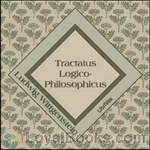 Tractatus Logico-Philosophicus
Tractatus Logico-Philosophicus
Tractatus Logico-Philosophicus is the only book-length philosophical work published by the Austrian philosopher Ludwig Wittgenstein during his lifetime. He wrote it as a soldier and a prisoner of war during World War I. The slim volume (fewer than eighty pages) comprises a system of short statements, numbered 1, 1.1, 1.11, 1.12, etc., through to 7, intended to be such that 1.1 is a comment on or elaboration of 1, 1.11 and 1.12 comments on 1.1, and so forth. It is an ambitious project to identify the relationship between language and reality and to define the limits of science. | |
By: Jeremy Bentham (1748-1832) | |
|---|---|
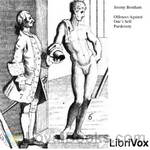 Offences Against One's Self: Paederasty
Offences Against One's Self: Paederasty
Jeremy Bentham (1748-1832) was an English jurist, philosopher, and legal and social reformer. He was a political radical and a leading theorist in Anglo-American philosophy of law. He is best known as an early advocate of utilitarianism and animal rights who influenced the development of liberalism. The essay Offences Against One’s Self (c. 1785), argued for the liberalisation of laws prohibiting homosexuality. The essay remained unpublished during Bentham’s lifetime for fear of offending public morality... | |
 An Introduction to the Principles of Morals and Legislation
An Introduction to the Principles of Morals and Legislation
Jeremy Bentham's Introduction to the Principles of Morals and Legislation, a classic text in modern philosophy and jurisprudence, first published in 1789, focuses on the principle of utility and how this view of morality ties into legislative practices. Bentham's ambition in life was to create a complete Utilitarian code of law. The philosophy of utilitarianism argues that the right act or policy is that which would cause "the greatest good for the greatest number of people", also known as "the greatest happiness principle", or the principle of utility... | |
By: Maria Montessori (1870-1952) | |
|---|---|
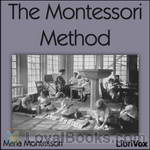 The Montessori Method
The Montessori Method
In the early 1900’s Dr. Maria Montessori began to reform educational methods with her work the ‘Case dei Bambini’ in Rome, Italy. Montessori began her work by developing methods to educate mentally retarded children, the method she developed was used with several children who at age eight took the state examinations in reading and writing, the children passed with above average scores. Because of this success (which is known as the ‘first Montessori Miracle’) Dr. Montessori was asked to open a school for children in Rome which she did... | |
By: Alfred North Whitehead (1861-1947) | |
|---|---|
 The Concept of Nature
The Concept of Nature
In The Concept of Nature, Alfred North Whitehead discusses the interrelatedness of time, space, and human perception.The idea of objects as ‘occasions of experience’, arguments against body-mind duality and the search for an all-encompassing ‘philosophy of nature’ are examined, with specific reference to contemporary (Einstein, with whose theory of relativity he has some complaints) and ancient (Plato, Aristotle) approaches. | |
By: Brontë sisters | |
|---|---|
 Selected Poems by Currer, Ellis and Acton Bell
Selected Poems by Currer, Ellis and Acton Bell
Poems by Currer, Ellis and Acton Bell was a volume of poetry published jointly by the three Bronte sisters, Charlotte, Emily and Anne in 1846, and their first work to ever go in print. To evade contemporary prejudice against female writers, the Bronte sisters adopted androgynous first names. Marked by profound sentiments, gravity and melodious harmony, the poems are strewn on the fields of soulful love, rueful reminiscence and the immortal yearnings of a Christian soul, and represent a fragrant assemblage of noetic flowers from the glebes of olden England... | |
By: St. George Stock (b. 1850) | |
|---|---|
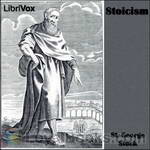 Stoicism
Stoicism
This short book is part of the Philosophies Ancient and Modern series, which attempts to make Western philosophy more accessible to the general public. In this volume, George Stock provides a concise primer on Stoicism, the ancient philosophy that maintained that the universe is governed entirely by fate, and that humans can achieve happiness only by cultivating a calm acceptance of the vicissitudes of life. Among the Stoics of the Greek and Roman world were its founder, Zeno, the former slave Epictetus, and the Roman emperor Marcus Aurelius... | |
By: Lieh Tzu | |
|---|---|
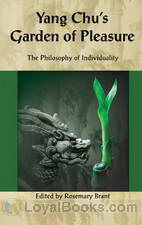 Yang Chu's Garden of Pleasure
Yang Chu's Garden of Pleasure
At the Court of Liang at the period of Yang Chu, about 300 B.C., the philosophers were treated as guests of the reigning king, who reserved for them lodging and maintenance, and encouraged all who had any pretence to the pursuit of truth and wisdom. Whether or not Yang Chu was actually a native of the Wei State, or whether he came there drawn by the attraction of a critical and unrivalled audience, it is at least certain that he settled there as small proprietor, probably in the reign of King Hwei, and continued there till his death, about 250 B... | |
By: Charles W. Leadbeater (1854-1934) | |
|---|---|
 Vegetarianism and Occultism
Vegetarianism and Occultism
How does occultism regard vegetarianism? It regards it very favorably, and that for many reasons. These reasons may be divided into two classes: those which are ordinary and physical, and those which are occult or hidden. Let us see in detail why a vegetarian diet is emphatically the purest and the best. | |
By: John McTaggart (1866-1925) | |
|---|---|
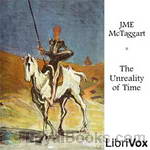 The Unreality of Time
The Unreality of Time
John McTaggart (1866-1925) was a British metaphysician and philosophical idealist. In this famous article for the periodical Mind, he introduced the notion of the A, B and C series, which was to become a leading theory in explaining the nature of time. | |
By: George Berkeley (1685-1753) | |
|---|---|
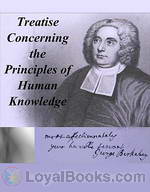 A Treatise Concerning the Principles of Human Knowledge
A Treatise Concerning the Principles of Human Knowledge
A Treatise Concerning the Principles of Human Knowledge, Part 1 (Commonly called “Treatise” when referring to Berkeley’s works) is a 1710 work by the Irish Empiricist philosopher George Berkeley. It largely seeks to refute the claims made by his contemporary John Locke about the nature of human perception. Both Locke and Berkeley agreed that there was an outside world, and it was this world which caused the ideas one has within one’s mind. Berkeley sought to prove that the outside world was also composed solely of ideas, suggesting that “Ideas can only resemble Ideas”... | |
 Three Dialogues Between Hylas and Philonous
Three Dialogues Between Hylas and Philonous
Berkeley uses Hylas as his primary contemporary philosophical adversary, John Locke. A Hylas is featured in Greek mythology and the name Hylas is derived from an ancient Greek word for “matter” which Hylas argues for in the dialogues. Philonous translates as “lover of mind.” In The First Dialogue, Hylas expresses his disdain for skepticism, adding that he has heard Philonous to have “maintained the most extravagant opinion… namely, that there is no such thing as material substance in the world.” Philonous argues that it is actually Hylas who is the skeptic and that he can prove it. Thus, a philosophical battle of wit begins. | |
 A Essay Towards a New Theory of Vision
A Essay Towards a New Theory of Vision
| |
By: Desiderius Erasmus (1466/69-1536) | |
|---|---|
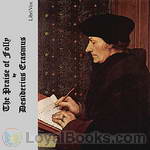 The Praise of Folly
The Praise of Folly
The Praise of Folly (Greek title: Morias Enkomion (Μωρίας Εγκώμιον), Latin: Stultitiae Laus, sometimes translated as In Praise of Folly, Dutch title: Lof der Zotheid) is a satirical essay written in 1509 by Desiderius Erasmus of Rotterdam (1466/69-1536). It is considered one of the most influential works of literature in Western civilization and one of the catalysts of the Protestant Reformation.It starts off with a satirical learned encomium after the manner of the Greek satirist... | |
By: Carl von Clausewitz (1780-1831) | |
|---|---|
 On War
On War
A classic work on military strategy by a veteran of the Napoleonic Wars. The author's style is dialectical: he makes two strong but opposing statements and then draws them together to describe many facets of war. Free of technical jargon, and suitable for modern readers. This audiobook is based on a 1909 English translation. | |
By: Théodule Ribot (1839-1916) | |
|---|---|
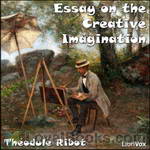 Essay on the Creative Imagination
Essay on the Creative Imagination
“It is quite generally recognized that psychology has remained in the semi-mythological, semi-scholastic period longer than most attempts at scientific formulization. For a long time it has been the “spook science” per se, and the imagination, now analyzed by M. Ribot in such a masterly manner, has been one of the most persistent, apparently real, though very indefinite, of psychological spooks. Whereas people have been accustomed to speak of the imagination as an entity sui generis, as a... | |
By: Lysander Spooner | |
|---|---|
 Essay on the Trial by Jury
Essay on the Trial by Jury
FOR more than six hundred years that is, since Magna Carta, in 1215 there has been no clearer principle of English or American constitutional law, than that, in criminal cases, it is not only the right and duty of juries to judge what are the facts, what is the law, and what was the moral intent of the accused; but that it is also their right, and their primary and paramount duty, to judge of the justice of the law, and to hold all laws invalid, that are, in their opinion, unjust or oppressive, and all persons guiltless in violating, or resisting the execution of, such laws... | |
 Vices Are Not Crimes
Vices Are Not Crimes
Lysander Spooner was an American individualist anarchist, entrepreneur, political philosopher, abolitionist, supporter of the labour movement, and legal theorist of the nineteenth century. Here he gives his views on the role of Governments in the private lives of their citizens | |
By: Michel Eyquem de Montaigne (1533-1592) | |
|---|---|
 Essays, Book 1
Essays, Book 1
Michel Eyquem de Montaigne is one of the most influential writers of the French Renaissance, known for popularising the essay as a literary genre and is popularly thought of as the father of Modern Skepticism. He became famous for his effortless ability to merge serious intellectual speculation with casual anecdotes and autobiography—and his massive volume Essais (translated literally as "Attempts") contains, to this day, some of the most widely influential essays ever written. | |
By: William Blackstone | |
|---|---|
 Commentaries on the Laws of England (1765)
Commentaries on the Laws of England (1765)
The Commentaries on the Laws of England are an influential 18th century treatise on the common law of England by Sir William Blackstone, originally published by the Clarendon Press at Oxford, 1765-1769.The Commentaries were long regarded as the leading work on the development of English law and played a role in the development of the American legal system. They were in fact the first methodical treatise on the common law suitable for a lay readership since at least the Middle Ages. The common law of England has relied on precedent more than statute and codifications and has been far less amenable than the civil law, developed from the Roman law, to the needs of a treatise... | |
By: Voltairine de Cleyre | |
|---|---|
 Selected Essays
Selected Essays
Voltairine de Cleyre (1866–1912) was, according to Emma Goldman, “the most gifted and brilliant anarchist woman America ever produced.” Today she is not widely known as a consequence of her short life. De Cleyre was especially influenced by Thomas Paine, Mary Wollstonecraft and Clarence Darrow. After the hanging of the Haymarket protesters in 1887, she became an anarchist. “Till then I believed in the essential justice of the American law of trial by jury,” she wrote in an autobiographical essay, “After that I never could”... | |
 Selected Letters, Sketches and Stories
Selected Letters, Sketches and Stories
Voltairine de Cleyre (November 17, 1866 – June 20, 1912) was an American anarchist. She was skilled in many subjects and wrote essays, poems, letters, sketches, stories and speeches. These are her selected letters, sketches and stories. | |
By: Lao Tzu | |
|---|---|
 Laotzu's Tao and Wu Wei
Laotzu's Tao and Wu Wei
The classic of the Way and of High Virtue is the Tao Teh Ching. Its author is generally held as a contemporary of Confucius, Lao Tzu, or Laozi. The exact date of the book’s origin is disputed. The book is divided into two parts, the Upper Part and the Lower Part. The Upper Part consists of chapters 1-37, and each chapter begins with the word “Tao,” or the Way. The Lower Part consists of chapters 38-81, and each chapter begins with the words “Shang Teh,” or High Virtue. This 1919 edition names the Lower Part as the Wu Wei, or translated variously as “not doing,” “non-ado,” or “non-assertion... | |
By: Edward George Bulwer-Lytton (1803-1873) | |
|---|---|
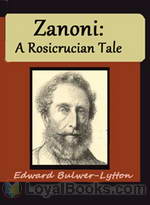 Zanoni
Zanoni
Zanoni, a timeless Rosicrucian brother, cannot fall in love without losing his power of immortality; but he does fall in love with Viola Pisani, a promising young opera singer from Naples, the daughter of Pisani, a misunderstood Italian violinist. An English gentleman named Glyndon loves Viola as well, but is indecisive about proposing marriage, and then renounces his love in order to pursue occult study. The story develops in the days of the French Revolution in 1789. Zanoni has lived since the Chaldean civilization... | |
By: Edmund Gosse (1849-1928) | |
|---|---|
 Three French Moralists and The Gallantry of France
Three French Moralists and The Gallantry of France
| |
By: Charles H. Spurgeon (1834-1892) | |
|---|---|
 All of Grace
All of Grace
HE WHO SPOKE and wrote this message will be greatly disappointed if it does not lead many to the Lord Jesus. It is sent forth in childlike dependence upon the power of God the Holy Ghost, to use it in the conversion of millions, if so He pleases. No doubt many poor men and women will take up this little volume, and the Lord will visit them with grace. To answer this end, the very plainest language has been chosen, and many homely expressions have been used. But if those of wealth and rank should glance at this book, the Holy Ghost can impress them also; since that which can be understood by the unlettered is none the less attractive to the instructed... | |
By: Bliss Perry (1860-1954) | |
|---|---|
 Fishing with a Worm
Fishing with a Worm
Fishing with a Worm by Bliss Perry includes the poignant and philisophical observations of a fly fisherman lured by the worm. Bliss Perry was a professor of literature at Princeton and Harvard Universities and spent time in Vermont writing and fly fishing. | |
By: Havelock Ellis (1859-1939) | |
|---|---|
 The Task of Social Hygiene
The Task of Social Hygiene
| |
By: Goldsworthy Lowes Dickinson (1862-1932) | |
|---|---|
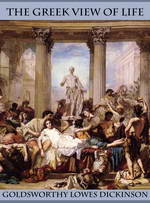 The Greek View of Life
The Greek View of Life
“With the Greek civilisation beauty perished from the world. Never again has it been possible for man to believe that harmony is in fact the truth of all existence.”This elegantly-written work provides a splendid introduction to the Greeks of the classic period: how they thought, wrote, and organised their lives and loves. Although it dates from the 1890s, there is very little about it that has dated. To its author’s credit, the subject of “Greek love” is dealt with in a sane and factual context - despite the judicial assassination of Oscar Wilde going on in the background... | |
By: Thomas Love Peacock (1785-1866) | |
|---|---|
 Crotchet Castle
Crotchet Castle
| |
By: Thomas R. Malthus (1766-1834) | |
|---|---|
 An Essay on the Principle of Population
An Essay on the Principle of Population
The power of population is indefinitely greater than the power in the earth to produce subsistence for man. Population, when unchecked, increases in a geometrical ratio. Subsistence increases only in an arithmetical ratio. A slight acquaintance with numbers will show the immensity of the first power in comparison with the second (Malthus). | |
By: Charles Alexander Eastman (1858-1939) | |
|---|---|
 The Soul of the Indian
The Soul of the Indian
"We also have a religion which was given to our forefathers, and has been handed down to us their children. It teaches us to be thankful, to be united, and to love one another! We never quarrel about religion." | |
By: Twentieth Century New Testament | |
|---|---|
 Twentieth Century New Testament
Twentieth Century New Testament
Published in 1904, The Twentieth Century New Testament is considered the first translation of the Bible into modern English. It was produced in Britain over a period of 15 years by approximately 20 people -- ministers, housewives, school teachers and businessmen -- who were united by their desire for a New Testament in the language of the people. They were advised by such scholars as J. Rendel Harris and Richard Weymouth so their rendering is quite accurate. In addition they made some effort at rearranging the New Testament books in the order scholars believe they were written -- Mark comes before Matthew, for instance... | |
By: Walter Pater (1839-1896) | |
|---|---|
 Marius the Epicurean
Marius the Epicurean
Marius the Epicurean is a philosophical novel written by Walter Pater, published in 1885. In it Pater displays, with fullness and elaboration, his ideal of the aesthetic life, his cult of beauty as opposed to bare asceticism, and his theory of the stimulating effect of the pursuit of beauty as an ideal of its own. The principles of what would be known as the Aesthetic movement were partly traceable to this book; and its impact was particularly felt on one of the movement’s leading proponents, Oscar Wilde, a former student of Pater at Oxford. | |
 Plato and Platonism
Plato and Platonism
| |
By: Benedict de Spinoza (1632-1677) | |
|---|---|
 The Ethics
The Ethics
The Ethics is a philosophical book written by Baruch Spinoza. It was written in Latin. Although it was published posthumously in 1677, it is his most famous work, and is considered his magnum opus.In The Ethics, Spinoza attempts to demonstrate a "fully cohesive philosophical system that strives to provide a coherent picture of reality and to comprehend the meaning of an ethical life. Following a logical step-by-step format, it defines in turn the nature of God, the mind, human bondage to the emotions, and the power of understanding -- moving from a consideration of the eternal, to speculate upon humanity's place in the natural order, freedom, and the path to attainable happiness... | |
By: William Healy, Mary Healy | |
|---|---|
 Pathological Lying, Accusation, and Swindling – A Study in Forensic Psychology
Pathological Lying, Accusation, and Swindling – A Study in Forensic Psychology
This work describes and analyzes several cases of pathological behavior. The interest comes not only from the cases themselves, but also from the of-its-time analysis which is mired in what we now know to be wrong thinking about mental illness, sexuality, gender, and race. - written by Mary Schneider | |
By: Emperor of Rome Marcus Aurelius (121-180) | |
|---|---|
 Thoughts of Marcus Aurelius
Thoughts of Marcus Aurelius
| |
By: Bahá'u'lláh | |
|---|---|
 The Arabic Hidden Words
The Arabic Hidden Words
Kalimát-i-Maknúnih or The Hidden Words is a book written in Baghdad around 1857 by Bahá'u'lláh, the founder of the Bahá'í Faith. This work is written partly in Arabic and partly in Persian. The Hidden Words is written in the form of a collection of short utterances, 71 in Arabic and 82 in Persian, in which Bahá'u'lláh claims to have taken the basic essence of certain spiritual truths and written them in brief form. Bahá'ís are advised by `Abdu'l-Bahá, the son of Bahá'u'lláh to read them every day and every night and to implement its latent wisdom into their daily lives... | |